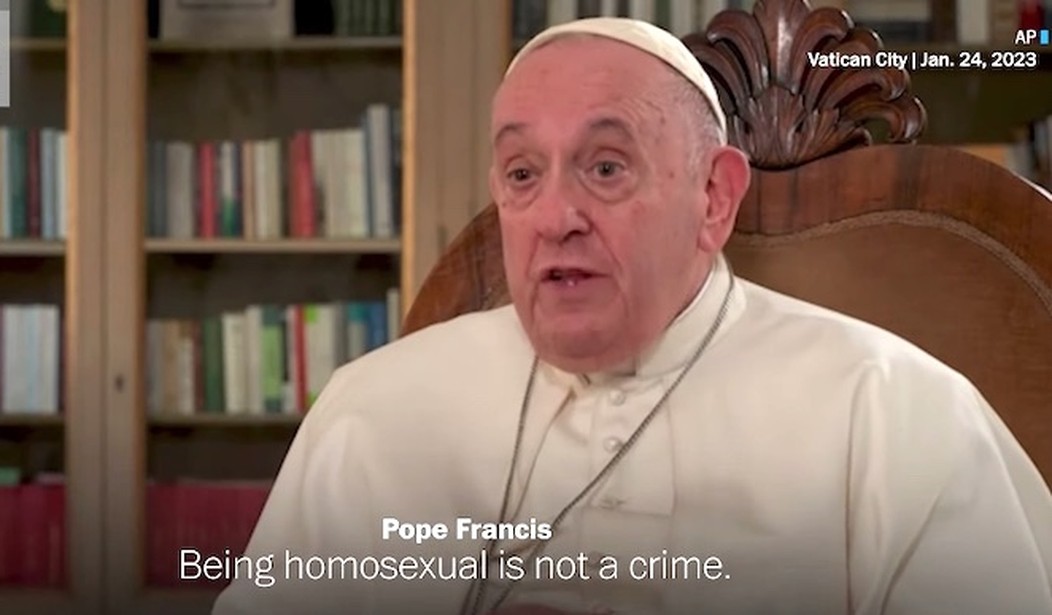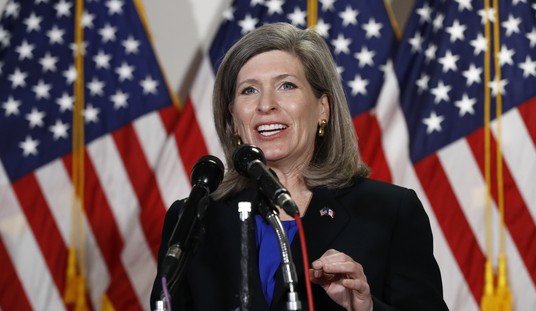Alternate headline: Pope Francis says absolutely nothing new. Technically, Francis may have taken a slightly more harsh line on homosexuality than church teachings suggest in his interview with the Associated Press. His declaration that “being homosexual is not a crime” does fit into a tension between progressives and conservatives within the Catholic Church, but perhaps in a more nuanced way than headlines this morning from American media outlets suggest.
First, let’s hear the quote directly in the Associated Press report from a few hours ago. Note what Francis says that homosexuality actually is, while not being a crime, and almost in the same breath:
Being homosexual is not a crime. It’s not a crime. Yes, it’s a sin. Well, yes, but let’s make the distinction first between sin and crime.
Aaaaaand … that’s it. That’s what has every American media outlet headlining these remarks, including the AP, although their original report made it a secondary point. The headline of their original report? “Pope discusses his health, critics and future papacy.”
Nothing about this statement is new. To speak in strictly technical terms, Francis errs to the harsh side (clearly inadvertently), as the Catholic Church’s catechism doesn’t make same-sex orientation a sin in itself. Same-sex actions are sinful, as are any sexual relations outside of a marriage based on the traditional model of one-man-one-woman. Sexual activity is blessed within such marriages (if consensual) and are sins in any other context. This is why the catechism urges Catholics to welcome gays as brothers and sisters, so that they can also hear the Word and repent of their sins, the way the rest of us do — and as long as they repent and resolve to sin no more, they can access all of the sacraments. Repenting means either engaging in a sacramental marriage and monogamy, or choosing celibacy … again, just as it does for every other Catholic.
It’s the repent-and-sin-no-more issue that is the sticking point, just as it is for all of us. Activists, including some bishops, have tried to get the pontiff to change doctrine to allow for same-sex marriages and other heterodox family forms, but Francis clearly refuses to do so. He wants the Church to be more welcoming, but still on the terms of the Word of God.
In other words, don’t expect those activists and bishops to cheer this statement. They’ve heard it before and know what it means. But this statement wasn’t meant for those bishops or activists. It appears aimed at the more conservative, traditionalist bishops who support secular laws criminalizing homosexual relations, which Francis sees as a barrier to his vision of a welcoming and loving church. In areas where gays and lesbians have to hide, they would likely fear coming to churches where they could be identified and arrested.
The AP suggests this is more prevalent in Africa, which is also where the Catholic Church is experiencing its most dynamic growth. The bishops from Africa have argued hard for a firm defense of church teachings on family, and have many good reasons for doing so. As at least one told me directly while I covered the Synod on the Family at the Vatican in 2014, any erosion of that position on same-sex relationships would be disastrous in Africa and the efforts to end polygamy among other religious and secular populations.
John Allen of Crux wrote about it at the time, too:
In 1987, the Fifth General Assembly of the All-Africa Conference of Churches, a Protestant ecumenical body, concluded that “the rather harsh attitude of the Church has been a painful but real cause of disintegration of some otherwise stable marriages and families.” In 1988, the Lambeth Conference of the Anglican Communion decided to admit polygamists under certain circumstances, in response to pressure from bishops in Kenya and Uganda.
Catholicism, however, has held the line. Speaking to a Black Catholic Congress in the United States in July 2007, Cardinal John Onaiyekan of Abuja, Nigeria, said that on polygamy, “the Catholic Church is particularly firm and consistent, giving no room whatsoever for doubts and exceptions.”
The church’s tough stance has been shaped not only by defense of tradition, but also impressions that polygamy discriminates against women. In the late 1990s, a survey of African Catholic theology cited 23 female African Catholic theologians who argued that since mutuality and equality are Biblical ideals, Scripture should not be used to justify polygamous marriage. …
When cardinals from around the world met in Rome last February to set the table for the October synod on the family, some prelates from non-Western cultures hinted that polygamy may drive them to oppose any change in the ban on divorced and remarried Catholics receiving the sacraments.
Their argument went like this: The Catholic Church has been telling people in polygamous marriages that they have to change because marriage means one man and one woman, for life. If the Church softens that teaching for the divorced and remarried, it might face pressure to cut a deal for polygamists, too. …
“They’ve been telling people that if you come into the church, you’ve got to choose one wife,” DiNardo said. “If you suddenly change that, couldn’t [people in polygamous marriages] say, ‘Why can’t you give me a break, too?’ ”
The 2014 synod left many of these issues dangling, at least in the eyes of activists on all sides. It ended with Francis, then in the middle of his second year as Pope, with a declaration of welcome to all regardless of family status, but again clearly on the terms of Church teaching. Nothing Francis says here is different than what he said at the 2014 synod, or what the collective bishops produced in that final declaration.
The only thing different, notes the AP, is that someone asked Francis specifically about criminalization of homosexuality for the first time:
Francis’ remarks come ahead of a trip to Africa, where such laws are common as they are in the Middle East. Many date from British colonial times or are inspired by Islamic law. Some Catholic bishops have strongly upheld them as consistent with Vatican teaching, while others have called for them to be overturned as a violation of basic human dignity.
In 2019, Francis had been expected to issue a statement opposing criminalization of homosexuality during a meeting with human rights groups that conducted research into the effects of such laws and so-called “conversion therapies.”
In the end, after word of the audience leaked, the pope didn’t meet with the groups. Instead, the Vatican No. 2 did and reaffirmed “the dignity of every human person and against every form of violence.”
There was no indication that Francis spoke out about such laws now because his more conservative predecessor, Pope Benedict XVI, recently died. The issue had never been raised in an interview, but Francis willingly responded, citing even the statistics about the number of countries where homosexuality is criminalized.
That seems a little too coincidental to believe. Did someone at the Vatican suggest that question to the reporter? It certainly is convenient for Francis to get this on the table before his trip to meet the bishops of Africa, as it lets them know that he will press them to get fully behind the 2014 agreement and on board with his vision. That’s fine, as long as the pontiff understands their position in Africa, where one fellow bishop has recently been martyred for Christ and the threat of violence looms much closer to the Church than in most of the world.
Update: The AP removed their video from YouTube, although I do not know why. I’ve replaced it with the Washington Post version of the video instead.







Join the conversation as a VIP Member